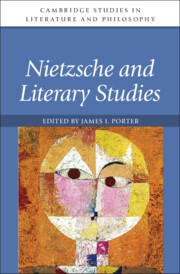Book contents
- Nietzsche and Literary Studies
- Cambridge Studies in Literature and Philosophy
- Nietzsche and Literary Studies
- Copyright page
- Contents
- Contributors
- Abbreviations
- Introduction
- 1 Heraclitus’ Clarity
- 2 Ariadne, or the Mediation of the Image
- 3 Nietzsche’s Centaurs
- 4 Nietzsche on the Task of the Poets in His Middle Writings
- 5 Some Images in Nietzsche’s Zarathustra
- 6 Nietzsche Ludens
- 7 Nietzsche and French Literature from the End of the Nineteenth Century to 1914
- 8 Ecce Mann
- 9 Plant Imaginaries and Human Existence in Nietzsche and Sartre
- 10 The Resources of the Figure
- 11 Nietzsche and Jewish Survival between Sarah Kofman and Jacques Derrida
- Editions and Translations of Nietzsche’s Works
- References
- Index
4 - Nietzsche on the Task of the Poets in His Middle Writings
Published online by Cambridge University Press: 03 May 2024
- Nietzsche and Literary Studies
- Cambridge Studies in Literature and Philosophy
- Nietzsche and Literary Studies
- Copyright page
- Contents
- Contributors
- Abbreviations
- Introduction
- 1 Heraclitus’ Clarity
- 2 Ariadne, or the Mediation of the Image
- 3 Nietzsche’s Centaurs
- 4 Nietzsche on the Task of the Poets in His Middle Writings
- 5 Some Images in Nietzsche’s Zarathustra
- 6 Nietzsche Ludens
- 7 Nietzsche and French Literature from the End of the Nineteenth Century to 1914
- 8 Ecce Mann
- 9 Plant Imaginaries and Human Existence in Nietzsche and Sartre
- 10 The Resources of the Figure
- 11 Nietzsche and Jewish Survival between Sarah Kofman and Jacques Derrida
- Editions and Translations of Nietzsche’s Works
- References
- Index
Summary
Appreciations of Nietzsche as a so-called poet-philosopher reveal little about Nietzsche’s thinking about the poets and they pay insufficient attention to his conception of philosophy. This chapter offers a corrective by examining how he figures the task of the poets in his middle writings. The focus is on what he has to say about the poets in relation to the passions, as this provides the best way of approaching the problem. His criticisms of the poets – that they are fundamentally melancholic and that they too readily give vent to naturalizing impulses – is best seen in the context of his upholding philosophy’s classical concern with and teaching of the mastery of the passions. The concern with self-cultivation informs Nietzsche’s conception of philosophy at a deep level, and it also drives his reflections on the poets. Poets are significant because they assume the task of providing signposts to the future by developing images of what he calls “beautiful human beings.” I attend to Nietzsche’s interest in Adalbert Stifter’s novel Indian Summer in the final section of the chapter, since it is from Stifter that Nietzsche may have derived, at least in part, his conception of the cultivation of beautiful human beings.
Keywords
- Type
- Chapter
- Information
- Nietzsche and Literary Studies , pp. 91 - 120Publisher: Cambridge University PressPrint publication year: 2024

